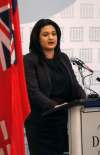The price of power
Tories cost out their campaign promises
Advertisement
Read this article for free:
or
Already have an account? Log in here »
To continue reading, please subscribe:
Monthly Digital Subscription
$0 for the first 4 weeks*
- Enjoy unlimited reading on winnipegfreepress.com
- Read the E-Edition, our digital replica newspaper
- Access News Break, our award-winning app
- Play interactive puzzles
*No charge for 4 weeks then price increases to the regular rate of $19.00 plus GST every four weeks. Offer available to new and qualified returning subscribers only. Cancel any time.
Monthly Digital Subscription
$4.75/week*
- Enjoy unlimited reading on winnipegfreepress.com
- Read the E-Edition, our digital replica newspaper
- Access News Break, our award-winning app
- Play interactive puzzles
*Billed as $19 plus GST every four weeks. Cancel any time.
To continue reading, please subscribe:
Add Free Press access to your Brandon Sun subscription for only an additional
$1 for the first 4 weeks*
*Your next subscription payment will increase by $1.00 and you will be charged $16.99 plus GST for four weeks. After four weeks, your payment will increase to $23.99 plus GST every four weeks.
Read unlimited articles for free today:
or
Already have an account? Log in here »
Hey there, time traveller!
This article was published 08/04/2016 (3537 days ago), so information in it may no longer be current.
Tory Leader Brian Pallister strolled into a packed hotel café just after 8 a.m. Friday morning with his wife, Esther, took a healthy bite from a muffin, and steadied himself for what was easily one of the most important moments of the election campaign.
Pallister is, by all accounts and available measurements, the man who will be premier. His Progressive Conservative party is leading every opinion poll by a wide margin. Given his opposition is currently comprised of deeply wounded New Democrats and highly dysfunctional Liberals, there is simply nothing standing in his way.
And yet, as he attended a breakfast gathering of supporters and candidates at Winnipeg’s Inn at the Forks, you could tell Pallister was just a tad nervous. And with good reason; there are still 10 days to go before election day, and he still has a few wrinkles in his otherwise smooth campaign. Chief among them is his fiscal policy, the focus of his breakfast announcement.

Quick recap: since he became leader in 2012, Pallister has struggled to find a fiscal identity. He wants to be a tax cutter and a true fiscal conservative. However, he also wants to maintain core services and pump money into infrastructure. All these realities have resulted in some confusing, and contradictory, policy assertions. It has also provided the NDP with ample opportunity to portray Pallister as a fiscal hawk who will eviscerate core services.
Friday morning, Pallister released a costing of all his campaign pledges, his last and best hope to drive a stake through these allegations. After the announcement, three fundamental truths about the Tory campaign were revealed.
First, Pallister’s arithmetic is just as awkward and tortured as ever. Pallister has tried to book nearly $139 million in savings and cuts to balance off about $117 million in additional spending related to campaign pledges. The net result, Pallister told supporters Friday, was a $22-million net improvement in the province’s bottom line.
The calculations entailed in the Tory fiscal plan are best seen as educated wagers. There is a modicum of reality in almost all the pledges and forecasts, although there are also healthy doses of unbridled optimism and meatball economics.
To make his plan work, Pallister is counting on savings from some pretty concrete moves: $5 million by shrinking the size of cabinet; $11 million from a reduction in government advertising; $2.35 million from reduced government travel; and $8 million by rolling the East Side Road Authority, overseers of the all-weather road up the east side of Lake Winnipeg, into the Department of Infrastructure and Transportation.
There was also a number of other, larger, less concrete pledges that are essential if Pallister is to have any hope of reaching his fiscal goals.
The Tories believe they can save $51 million worth of cost-efficiency savings across all government departments by 2018. At first blush, that doesn’t seem like a lot; the provincial budget was more than $13.5 billion this year. However, Pallister does not at this point have one clear idea how to find the savings. That will come from a government-wide audit that will reveal waste and duplication. That is a pretty big “trust me” moment for Pallister.
Other proposals are purely theoretical, bordering on the unrealistic. A Tory government believes it could save $26 million annually by not forcing companies doing business with the province to unionize and by opening up competition on Manitoba contracts to companies in British Columbia, Alberta and Saskatchewan through participation in the New West Partnership.
These savings are not just difficult to calculate, they are nearly impossible to track. And certainly, in an environment where the cost of government services goes up every year with inflation, it would be virtually impossible to count on these measures to help Pallister balance the budget. Most importantly, none of the savings Pallister has announced will do anything significant to reduce the deficit.
Which brings us the second fundamental truth uncovered by the Tory fiscal plan: although it is not about deep cuts to government services, it certainly is a plan that will lead to less government.
The $51 million in savings Pallister hopes to find over his first 18 months in government must involve decisions to taper or eliminate some things government is currently doing. The same goes for his broader promise to hold government spending to a three per cent annual increase; it can be done, but not without some pain.
Pallister may ultimately be able to sell Manitobans on the idea that less is ultimately more. For now, he has the luxury of telling voters he can spend less and get the same level of service. It will take a couple of years to determine with any certainty if this was a realistic plan, or just electoral marketing.
Which brings us to the last, and perhaps most important, reality revealed Friday: voters do not seem to care that Pallister’s numbers don’t work.
At this late stage in the campaign, it appears certain a large portion of the Manitoba electorate will support the Tories on the hope Pallister represents a new culture and approach to governing. And that while his numbers don’t make much sense now, he will ultimately figure things out.
Why would voters ignore Pallister’s strained fiscal logic? In the end, Pallister and the Tories are not the NDP. After nearly 17 years in government, Manitobans have had enough of the NDP. As a result, NDP fear-mongering about Pallister’s hidden austerity agenda cannot trump the electorate’s appetite for change. History will show that on this one Friday morning, late in the 41st election campaign, Pallister visited a hotel café, ate a muffin and gave voters a somewhat tenuous vision of his government’s fiscal policies.
And that voters decided to elect him anyway.
dan.lett@freepress.mb.ca
Twitter: @danlett

Dan Lett is a columnist for the Free Press, providing opinion and commentary on politics in Winnipeg and beyond. Born and raised in Toronto, Dan joined the Free Press in 1986. Read more about Dan.
Dan’s columns are built on facts and reactions, but offer his personal views through arguments and analysis. The Free Press’ editing team reviews Dan’s columns before they are posted online or published in print — part of the our tradition, since 1872, of producing reliable independent journalism. Read more about Free Press’s history and mandate, and learn how our newsroom operates.
Our newsroom depends on a growing audience of readers to power our journalism. If you are not a paid reader, please consider becoming a subscriber.
Our newsroom depends on its audience of readers to power our journalism. Thank you for your support.











